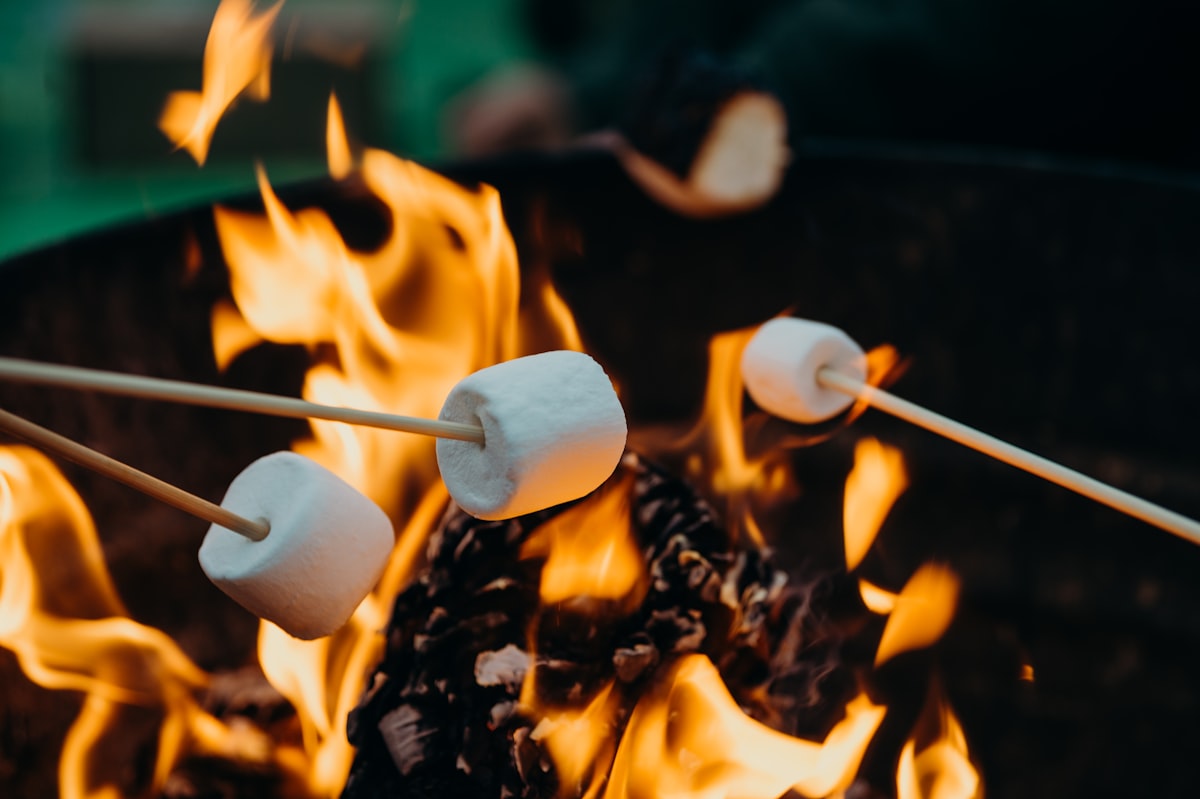Delayed Gratification
Not counting those dissolved in hot chocolate or melted into rice krispie treats, I consume about five marshmallows total a year. Always toasted on a campfire.

There is
a famous experiment
in which a marshmallow
is placed in front of a child.
The child is told that they may eat the marshmallow
but if they wait
and do not eat it
a second marshmallow will be given to them.
Not counting those dissolved in hot chocolate or melted into rice krispie treats, I consume about five marshmallows total a year. Always toasted on a campfire.
The goal of the Stanford marshmallow test
was to explore the human capacity
for embracing delayed gratification
over a lesser, more immediate reward.
Okay so they start out getting toasted, but I just can't keep myself from inching them closer and closer to the hottest coals, because the golden brown color is just happening too slowly.
The lead psychologist in the study followed
that the children who were able to delay gratification and not eat the marshmallow, finding that these children
grew up to have a lower body mass index, went further in school, and did better on their SATs than the ones who couldn't hold out and ate the marshmallow.
Damn it, my marshmallow's on fire again!
This delayed gratification thing explains a lot.
Real talk:
Eating toasted marshmallows straight-up is sticky and ungratifying when you have the option of adding chocolate and graham crackers. We call them s'mores because we always want some more and we want Some More so badly we can't even take the time to say it in two words.
If the delayed gratification of toasting a marshmallow and making a s'more are too much for you, you can now buy pre-made s'mores from the Girl Scouts.
This avoids the time it takes to build a campfire and toast to golden perfection but doesn't take into consideration the month it takes for your Girl Scout cookie order to be delivered.
In some ways the pre-made s'mores is the most delayed gratification of them all.
In some ways the pre-made s'mores have a flavor experience even more disappointing than eating an un-toasted marshmallow.
This is the rub of the Stanford marshmallow experiment. The marshmallows aren't even that good. The temptation is all in our mind, the regret so immediate.
This is the experiment that found the source of day-after head shaking, the genetic predisposition toward overdraft fees and missed job interviews
This is why I still pull into the nastyburger drive thru when I have much better food in my home refrigerator five minutes away and even in the moment I have no hope of actually enjoying my meal. Yes, I want undercooked, oversalted fries with that.
The Stanford marshmallow test
is cruel and unusual punishment
and should be banned by the Geneva convention.
I am not going to eat that marshmallow.
It isn't even that I want the marshmallow.
It's just that I know it will likely determine the course of my entire life.
But, that marshmallow, though...
This is an evolutionary adaptation
from back when we were hunter-gatherers
storing up marshmallows to fuel us through the long winter,
our reserves dwindling down to the very last one.
knowing the months ahead in the cave will be cold and lean
and that without solid SAT scores there is no way we will make it into a decent college.
Come spring, we will need that one last marshmallow to plant in the ground
to grow into a mighty marshmallow tree that we might harvest sustainably and begin our transformation to an agrarian society.
These marshmallow-resisting behaviors nature has selected as best fit for our survival as a species,
the ones my primitive ancestors passed on to my ancient ancestors who passed them on to me.
Sitting here alone
in this room
with this stupid marshmallow
and a lifetime of disappointment and lousy SAT scores ahead of me
yet to overcome
I am going to wait.
I am going to hold out.
I am going to exercise self control
for once.
As always
I am determined
and bored
and
just as disappointed
in the flavor of this un-toasted marshmallow
as I would have been
if I had waited
for the promised second one.
Christopher Clauss (he/him) is an introvert, Ravenclaw, father, poet, and middle school science teacher in rural New Hampshire. His mother believes his poetry is "just wonderful." His children declare that he is the "best daddy they have," and his pre-teen science students rave that he’s "Fine, I guess. Whatever."



